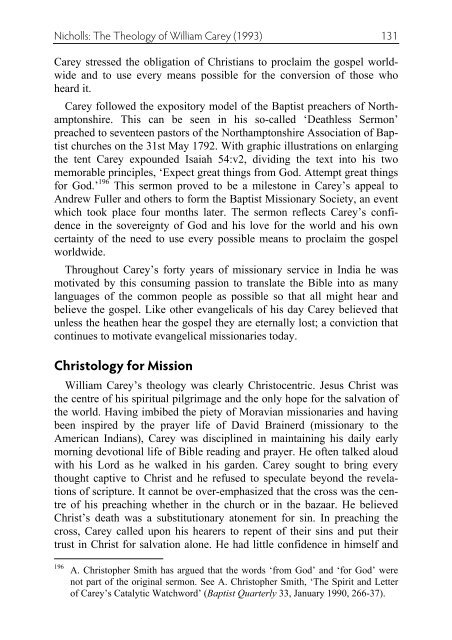Calvin and Missions - World Evangelical Alliance
Calvin and Missions - World Evangelical Alliance
Calvin and Missions - World Evangelical Alliance
You also want an ePaper? Increase the reach of your titles
YUMPU automatically turns print PDFs into web optimized ePapers that Google loves.
Nicholls: The Theology of William Carey (1993) 131<br />
Carey stressed the obligation of Christians to proclaim the gospel worldwide<br />
<strong>and</strong> to use every means possible for the conversion of those who<br />
heard it.<br />
Carey followed the expository model of the Baptist preachers of Northamptonshire.<br />
This can be seen in his so-called ‘Deathless Sermon’<br />
preached to seventeen pastors of the Northamptonshire Association of Baptist<br />
churches on the 31st May 1792. With graphic illustrations on enlarging<br />
the tent Carey expounded Isaiah 54:v2, dividing the text into his two<br />
memorable principles, ‘Expect great things from God. Attempt great things<br />
for God.’ 196 This sermon proved to be a milestone in Carey’s appeal to<br />
Andrew Fuller <strong>and</strong> others to form the Baptist Missionary Society, an event<br />
which took place four months later. The sermon reflects Carey’s confidence<br />
in the sovereignty of God <strong>and</strong> his love for the world <strong>and</strong> his own<br />
certainty of the need to use every possible means to proclaim the gospel<br />
worldwide.<br />
Throughout Carey’s forty years of missionary service in India he was<br />
motivated by this consuming passion to translate the Bible into as many<br />
languages of the common people as possible so that all might hear <strong>and</strong><br />
believe the gospel. Like other evangelicals of his day Carey believed that<br />
unless the heathen hear the gospel they are eternally lost; a conviction that<br />
continues to motivate evangelical missionaries today.<br />
Christology for Mission<br />
William Carey’s theology was clearly Christocentric. Jesus Christ was<br />
the centre of his spiritual pilgrimage <strong>and</strong> the only hope for the salvation of<br />
the world. Having imbibed the piety of Moravian missionaries <strong>and</strong> having<br />
been inspired by the prayer life of David Brainerd (missionary to the<br />
American Indians), Carey was disciplined in maintaining his daily early<br />
morning devotional life of Bible reading <strong>and</strong> prayer. He often talked aloud<br />
with his Lord as he walked in his garden. Carey sought to bring every<br />
thought captive to Christ <strong>and</strong> he refused to speculate beyond the revelations<br />
of scripture. It cannot be over-emphasized that the cross was the centre<br />
of his preaching whether in the church or in the bazaar. He believed<br />
Christ’s death was a substitutionary atonement for sin. In preaching the<br />
cross, Carey called upon his hearers to repent of their sins <strong>and</strong> put their<br />
trust in Christ for salvation alone. He had little confidence in himself <strong>and</strong><br />
196 A. Christopher Smith has argued that the words ‘from God’ <strong>and</strong> ‘for God’ were<br />
not part of the original sermon. See A. Christopher Smith, ‘The Spirit <strong>and</strong> Letter<br />
of Carey’s Catalytic Watchword’ (Baptist Quarterly 33, January 1990, 266-37).

















